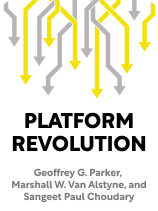

This article is an excerpt from the Shortform book guide to "Platform Revolution" by Geoffrey G. Parker, Marshall W. Van Alstyne, and Sangeet Paul Choudary. Shortform has the world's best summaries and analyses of books you should be reading.
Like this article? Sign up for a free trial here.
What are the benefits of platform business models? How are platforms affecting politics and the economy?
Platforms aren’t just an alternative to pipelines. Geoffrey G. Parker, Marshall W. Van Alstyne, and Sangeet Paul Choudary say platforms are outperforming pipelines and, in the process, transforming the world.
We’ll explain why platforms are taking over the market and explore the economic, social, and political effects.
1. Why Platforms Are Taking Over the Market
The authors of Platform Revolution explain that one benefit of platforms is that they perform better than their pipeline competitors and represent a growing share of the market. There are two reasons for this: First, platforms’ unique traits give them a competitive advantage. By leveraging network effects, outsourcing operations, and optimizing connections, platforms offer greater value to producers and consumers at less cost than pipelines are typically capable of, which contributes to faster and more unencumbered growth. Second, having noticed platforms’ competitive edge, many businesses that have historically relied on the pipeline business model are transitioning to (or integrating aspects of) the platform model by using the data they already collect to connect producers and consumers.
(Shortform note: Experts note that despite platforms’ market takeover, the business model may not be suitable for every company. In some cases, consumers want a middleman between themselves and producers because middlemen tend to deliver consistent results, while results may vary between producers. This has led e-commerce companies like Zappos and Gazelle to choose a pipeline resale model over the platform model. However, experts also agree with Parker, Van Alstyne, and Choudary that pipeline companies can benefit from integrating aspects of the platform model. For example, some pipeline businesses are partnering with resale platforms like ThredUp to encourage sustainability (a move that appeals to young consumers).
2. How Platforms Are Transforming the Economy, Society, and Politics
Platforms’ takeover of the market has had strong effects on the economy, society, and politics—and often these consequences are entangled. To illustrate, let’s explore two major consequences discussed by the authors.
By outsourcing their operations, platforms have democratized two major kinds of supply—supply of goods and supply of labor. Anyone can contribute any offering of value to the platform economy, even if they don’t meet traditional standards for suppliers. This phenomenon has significant societal implications—for example, platforms typically classify workers in their network as independent contractors rather than full-time employees. That classification impacts the number of protections those workers are entitled to, which has political ramifications—the authors say, for example, that some state governments have attempted to reclassify these workers.
The authors state that another way platforms have transformed the economy, society, and politics is by introducing what economists call “negative externalities”—costs or burdens experienced by those outside the network. For example, social media platforms have changed the way people consume news. This change in consumer behavior has threatened the livelihood of traditional news media and influenced national politics via data manipulation and the spread of disinformation, triggering debate over the need for government intervention.
| An Update on the Massive Global Influence of Platforms Let’s explore how the two consequences the authors discuss have played out in the US and abroad since the book’s publication. Parker, Van Alstyne, and Choudary argue that platforms have democratized the supply of goods and labor. Over the years, this trend has resulted in the formation of what’s known as the gig economy—a growing labor market characterized by independent contract work, usually for platform businesses. The US sees a greater proportion of marginalized people, like immigrants, participating in the gig economy because it’s easier to access than traditional employment—but experts note that these workers often find themselves stuck in a cycle of poverty, since their classification as independent contractors precludes benefits like health or unemployment insurance. Similar effects of the gig economy can be seen on a global scale, as well. Research suggests that the demand for independent contractors is growing in developing countries at nearly ten times the pace it is in North America. Experts note that this trend could benefit the global poor by democratizing access to job opportunities, but if these workers lack an adequate social safety net or don’t receive benefits, they may face the same difficulties as US gig workers. Parker, Van Alstyne, and Choudary also point to negative externalities as a transformative consequence of platforms’ market takeover, arguing that people outside of platforms’ networks may absorb some of the harm done by those platforms. One increasingly relevant negative externality is the harmful impact that social media platforms have had on global and domestic politics. For example, some allege that former president Donald Trump used social media to incite an insurrection in 2021, which led Facebook and Twitter (now known as X) to ban Trump from their platforms. As of February 2024, the US Supreme Court was considering whether using censorship to regulate negative externalities violates citizens’ right to free speech. As Parker, Van Alstyne, and Choudary note, the risks associated with the rise of digital platforms have significant political implications—for example, the European Union has settled on a protective policy for gig workers, and states like New York and Florida are currently taking action to limit children’s access to social media platforms. Such regulations could have wide-ranging effects. For example, while some argue that New York’s policy would protect children’s mental health, others worry that Florida’s legislation is a smokescreen for political censorship that would harm children by restricting their ability to learn and talk about progressive causes. |

———End of Preview———
Like what you just read? Read the rest of the world's best book summary and analysis of Geoffrey G. Parker, Marshall W. Van Alstyne, and Sangeet Paul Choudary's "Platform Revolution" at Shortform.
Here's what you'll find in our full Platform Revolution summary:
- How platforms like Spotify and Amazon became so successful
- What makes platform businesses so unique and competitive
- Tips for aspiring platform entrepreneurs






